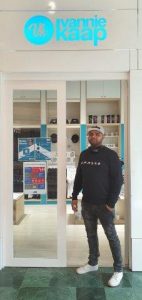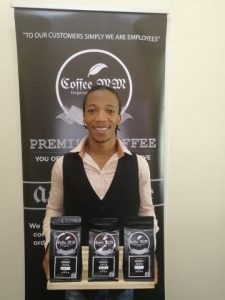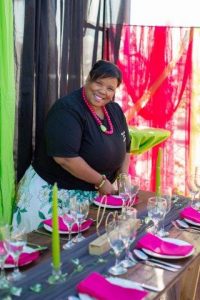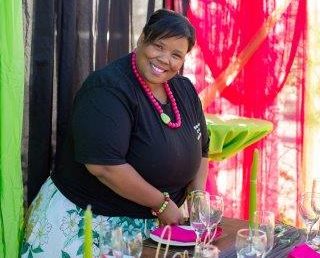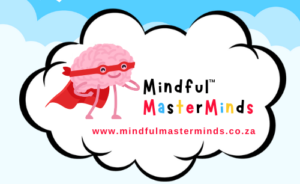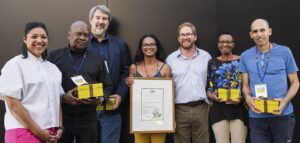The power of small enterprises to improve the lives of families and communities, especially in the challenging time of lockdown, was demonstrated when 21 small business owners from low-income areas of greater Cape Town graduated virtually from the sponsored Small Business Academy (SBA) programme of the University of Stellenbosch Business School (USB) last week (10 December 2020).
Michelle Maluqua (35), owner of MJ Events and Hiring in Klapmuts, a catering and décor business in Klapmuts, was named the Top Student with the highest mark overall after completing the sponsored nine-month development programme dedicated in empowering small business owners in disadvantaged areas to grow their businesses.
Aiming to positively influence the Cape Town coloured community, Marc Jacobs (45) from Wynberg and owner of Vannie Kaap was awarded with the Best Business Plan. The media agency from the outset opted to do things very differently by sharing South Africa’s unique humour and heritage on social media through meme’s which also adorn a number of household and personal items for purchase.
Mhlengi Ngocobo’s (26) from Idas Valley in Stellenbosch, is a 4th year student, artisan coffee merchant and owner of CoffeeMM and was awarded as the Business with the Most Potential. He aptly demonstrates that dreaming big is essential for any small business.
SBA head Dr Marietjie Theron-Wepener said it’s widely accepted that small businesses are the engines of economic growth and employment, and offer a logical route out of poverty, but many don’t make it past their first year because they lack business skills and the know-how to access finance and markets. “By equipping these business owners, we can strengthen their businesses, making them more sustainable contributors to the economy,” she said.
Now in its eight year, the SBA addresses the knowledge and support gap, in partnership with corporate sponsors who also share their inside business knowledge and experience with participants, creating networking opportunities and better understanding of the linkages between small and large businesses.
Each participant is mentored by a USB MBA alumnus, and many cite this as the most valuable part of the learning experience.
Top student Michelle, is an inspiring example of how tenacity can turn unemployment into a thriving business.
“In 2012 I was unemployed and struggled so much that I never knew where my next meal would come from. I always helped out at the church and in my community, setting-up for weddings, birthday parties and functions. Since I love the buzz of planning for such events, I knew that I could make a success of starting my own business.”
“In 2013 I found a job and that allowed me to save as much money as I could whilst still keeping afloat. It was during 2016 that I started with minimal capital to purchase goods which I sold to nearby farms, my church and even at a local market. I squirreled money to save up, quit my job and started working full-time in building my business. The business has grown to such an extent that I now employ nine people! We have a variety of products for sale from my home where I have renovated a section into a shop, and offer catering and events décor and planning.”
With COVID-19 impacting the hospitality industry to a great extent, so too was Michelle’s business brought to a stand-still.
“I was incredibly worried when the lockdown was announced but knew that this is a time to adapt and be innovative if I ever wanted a business to get back to. I started selling fresh fish over Easter and the demand was so great that we still continue to supply to our customers. I have expanded the offering to meat, cured and processed meats, as well as providing take-away meals over the weekends. When Level 1 was announced I expanded my events store by selling hand-made costume jewellery, beads, gift boxes, personalised items, party balloons and sanitising chemicals.”
Michelle says the SBA programme has been life changing and incredibly valuable to the future of her business.
“The programme changed my life in so many ways. When I started the course, I had no idea how much value it would add to my life as a young business owner. From the start when I met my mentor for the very first time, I was captivated and knew this would be the year of learning and putting new strategies in place to grow my business. The programme has though me how to manage my finances better, how to do a proper business plan, how to do a marketing plan and online marketing but also to never give up not even if there are a lot of competitors. I’m feeling so excited about the future of my business!”
What started out as a passion project for Marc a few years ago, has morphed into a successful business with the growth of Vannie Kaap.
“We were in the unique position where we first secured a strong, loyal following on social media with our quirky and true to the Cape Town culture meme’s before branching our business out into merchandise sold online and to a retail shop in Canal Walk Shopping Centre. Sadly, due to COVID-19, we had to close down two of our retail stores in other shopping centres but will revive those as soon as we can.”
“We provide a sense of nostalgia with all things from the Cape and it quickly resonated with not only our targeted audience, Coloureds, but with all South Africans across cultural divides, both locally and the expat market.”
Marc says the Cape Flats is well known for its negative stereotypes. “It comprises of a host of anti-social behaviour plaguing our communities and allowing it to perpetuate an outlook of doom and gloom and utter despair. However, our humour is incredibly unique and therefore we have decided to focus on the positives, highlight, and bring them to the forefront. This is what we aimed with Vannie Kaap and to become the brand and movement that can be the voice of change for a broader community.”
In offering an alternative platform for young entrepreneurs, Marc and his team launched, during COVID-19, the dite.vanniekaap.com platform – sharing with location pins small business owners who make unique, Cape-inspired, food items to encourage new patrons to support their local artisans.
“The platform has grown exponentially and we have just hit the 100 makers mark and even expat producers as far as Australia and Canada, showcasing their goods. I am so proud of this new chapter in Vannie Kaap’s offering – it’s true to our brand and true to our community spirit.”
Although Mhlengi’s artisan coffee business is still in its infancy, the resourceful entrepreneur has a passion for coffee and growing his business.
“When I was 13, I was diagnosed with hypertension. The bad news was that although the doctors did all sorts of tests, they could not find the cause and my life expectancy at the time was around 10 months. One doctor recommended that I start taking caffeinated beverages and it was then that a journey started on understanding good vs bad caffeine and more importantly, everything there is to know about coffee! I gained an intimate understanding of coffee and it was only natural for me to start a business of which I know everything there is about the raw product.”
So, what makes a good coffee in Mhlengi’s opinion? One that has incredible balance between being bold yet not so strong that you can’t pick up the delicate flavours. “For me it’s not just the taste but the ritual of making coffee – whether you plunge or use a fancy machine, the making is part of the anticipation of a great cup of coffee.”
Mhlengi already has a few major contracts which he currently runs solo with big plans to expand his staff compliment and market share. He finds being part of the SBA amidst the COVID-19 pandemic has truly been a blessing for him.
“The pandemic has brought so many challenges for me – coffee is not just enjoyed at home! It’s a social drink, enjoyed whilst being out and about, and naturally I was massively affected. However, the programme has allowed me to spend time on my business, shaping my offering, thinking strategically and more importantly optimising my operation and logistical framework. It has taught me resilience, a trait that is central to every entrepreneurs journey to success.”
Dr Theron-Wepener said the three winners had in common a drive to succeed and had demonstrated the ability to innovate and adapt their businesses to changing circumstances. “These are essential trait of entrepreneurs and one that came aptly evident during the COVID-19 pandemic”, she said.
“There wasn’t an industry or business that was not in some way affected by the lockdown. Small businesses especially were hit enormously hard. The value of networking, having the knowledge and skill-set to think differently during times of crises and standing together when times are tough, has helped our group of small business owners to keep their businesses afloat.”
“We are very proud of how far our participants on the programme have come in just nine months, facing enormous challenges along the way,” Dr Theron-Wepener said.
Applications are now open for the 2021 SBA programme.
The programme is substantially sponsored, although a commitment fee is due by participants. Applications are done online – download the application form at https://www.usb.ac.za/wp-content/uploads/2020/11/SBA-Application-Form-WC-2020-2021_new.pdf
Applications close on 29 January 2021 and the programme starts 15 March 2021.
For more information, call 084 514 2328
